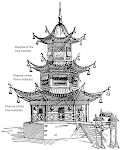1. How Buddha Dharma Views The Illusion of Personality.
2. A Brief History of the Stranger Than Fiction Doctrine of Corporate Personhood
A. The Heart of the American Revolution Was a Revolt Against Corporate Political Power.
B. The Corporate Trial of Strength by the Banks and Railroads
C. The Strange Case of
D. The Development of the Doctrine of Corporate Personhood
3. The Modern Political Power of Corporations is the American Brand of Fascism
4. A Path to Pierce the Illusion of Corporate Personhood
A. What Would a Real 21st Century Tea Party Revolt Against Corporate Property and Profits Look Like?
B. What is a Buddhist to Do?
This first installment is not actually what I've conceived of as the first section. This is the first draft of the first section of Part 2. Though based on the arising inspiration, the whole thing may be rearranged when all the parts are completed.
.
2. A Brief History of the Stranger Than Fiction Doctrine of Corporate Personhood
A. The Heart of the American Revolution Was a Revolt Against Corporate Political Power.
Because it is a perfect example of how the more things change the more they stay the same, let’s begin our story of corporate political influence with the founding of our nation. Few people realize that the birth of the United States of America
In the middle of the 18th century there was no more powerful corporation than the East India Company of England (EIC) with its great wealth from trade specializing in cotton, silk, dyes, saltpeter, salt, tea, and opium. Its power was so vast that it ruled over its trade territories as an autonomous pseudo-government, printing money, enforcing its laws, and claiming land in its own name. But like the corporations of today it was not immune to the depressions of economic fortunes, and at the beginning of the 1770s it faced bankruptcy due to changes in financial conditions. The EIC went to Parliament, and not unlike today, it’s leaders claimed that it was a corporation too big to fail and successfully sought a governmental bail out. The bail out bill was known as the Regulating Act of 1773.
As a concession for bailing out the corporation, Parliament exacted acknowledgement from the EIC that any act of sovereignty that was made by the operators of the EIC as subjects of the Crown was in fact for the benefit of the sovereignty of the Crown and not in EIC’s own right. Thus Parliament exerted its ultimate political control over the EIC, but in so doing it admitted, both in the Act and de facto, the “right” of the EIC to have influence over Parliament through the political process. As part of the 1773 Act’s bail out program, the EIC was given both greater autonomy in its business enterprises in the American Colonies and tax relief in the form of rebates and exemptions from tea import duties that the much smaller Colonial traders were still forced to pay.
As the result of their bail out and tax favoritism, the EIC was able to undersell its Colonial entrepreneurial competitors to drive many of them out of business. The response to this exercise of raw transnational corporate power was the revolt that has became known as the Boston Tea Party where the patriotic rioters destroyed the private property of the corporation by throwing the bales of tea into the salt water and ruining them. This illegal destruction of corporation property was among the first acts of open defiance leading up to our nation’s Declaration of Independence.
Of course today, destroying the property of the powerful transnational corporations is still considered illegal by the political powers that be, yet no one can deny that such destruction of corporate property has a hallowed place in the shrine of American history. It seems that today’s Tea Party adherents have completely forgotten the lesson of the original Tea Party as they fawn over the rich and powerful in the corporations who control their agenda, such as today’s Tea Party’s love of corporate controlled health care. If it were not for the powerful corporations’ control of Colonial economics and the Colonists’ revolt against those transnational corporations, the USA
It was this experience with the scope of political power of the large corporations that informed the founding fathers’ view of corporations and explains why the word “corporation” does not appear in the U.S. Constitution or Bill of Rights. The compatriots of the original Tea Party knew that corporations need to be limited in their political power and influence. Thus, with the founding of our nation the American laws protected people from corporations in ways that other nations did not. For example, only natural humans were considered to be the “people” who had the protection of the First Amendment for their free speech. Only natural humans had the protection of the Fourth Amendment right to privacy. Only natural people had the Fifth Amendment protection against double jeopardy and the right to silence if accused of a crime. Only natural people could be shareholders and Corporations were not allowed to be shareholders of other corporations. Corporations could not give money to politicians or try to influence elections on the rationale that they had no business doing so because they could not vote. Corporations were only chartered for specific purposes with at least a colorable claim that the purpose was “for the public good” and they were typically established for a specific term of years related to that purpose. The requirement of a single purpose that was for the benefit of the public (such as building a bridge, operating a toll road, running a university, etc.) was far different from today’s view that the only purpose of a corporation is to make profits for its owners.
In fact the threat of the power of corporations was so well known to the founding fathers such as Sam Adams who participated in the original Boston Tea Party, that Thomas Jefferson and James Madison apparently proposed a so-called “11th Amendment” that would have placed corporations into the Constitution for the purpose of a Federal restriction on their power in the manner of the other restrictions on the power of the Federal Government and making most of the above restrictions on corporations part of the Constitution. The story goes that their proposed Amendment was rejected by Congress with the help of the argument that it was not necessary to put it into the Constitution because the states already had those regulatory restrictions in place in their state laws.
I have not found original source material for this story of a Jefferson-Madison Amendment aimed at corporations, however, whether or not the legend of their proposal is true, it is undeniable that both Jefferson and Madison expressed clear reservations about corporations. Jefferson said in 1816, “I hope that we shall crush ... in its birth the aristocracy of our moneyed corporations, which dare already to challenge our government to a trial of strength, and bid defiance to the laws of our country. I sincerely believe that banking establishments are more dangerous than standing armies.” And by the end of his life, Madison’s views on corporations were equally plain as stated in a letter dated March 10, 1827, “Incorporated Companies with proper limitations and guards, may in particular cases, be useful; but they are at best a necessary evil only.” There can be no doubt that both of these founding fathers were advocates for strong limitations and safeguards against the political power of corporations.
*****
Comments invited.



No comments:
Post a Comment